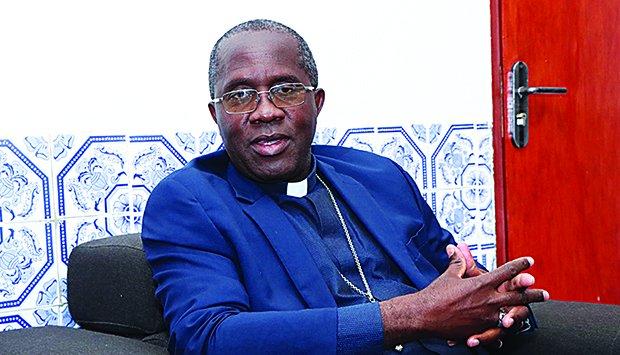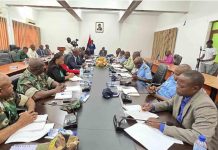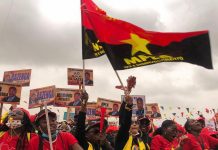Africa-Press – Angola. Academics and religious leaders from the province of Cuando Cubango considered opportune, yesterday, the Executive’s decision to approve pecuniary and social incentives for civil servants and administrative agents who carry out work activities in remote and difficult-to-access areas, devoid of goods and essential services.
The measure recently approved by the Council of Ministers aims to contemplate public servants and administrative agents in areas of difficult access, without conditions of essential goods and services, with isolation, installation and rent subsidies, as well as preference in the mobility of the spouse , access to housing and other benefits granted by the State.
The bishop of the diocese of Menongue, Dom Leopoldo Ndakalako, said that the implementation of the payment of the isolation subsidy will encourage the permanence of civil servants and administrative agents in remote areas and of difficult access in work areas.
Dom Leopoldo Ndakalako said that the measure will significantly improve the provision of public services, especially in the Education and Health sectors, where several schools and health units are struggling with the problem of staff dropping out, motivated by the lack of conditions of accommodation.
He said that in Cuando Cubango, specifically, the decision was well thought out, where the working conditions are completely different for professionals who work in the provincial capital (Menongue) compared to those in the other municipalities in the interior, whose distances exceed 700 kilometers .
“This initiative by the Executive will ensure better provision of services in the most remote and difficult to access areas, where there are very few conditions from a structural point of view, such as schools, residences for workers, health centers, police stations, among others, where professionals run enormous risks in the exercise of functions that, in fact, deserve to be dignified”, he acknowledged.
Monsignor Leopoldo Ndakalako requested that, this time, this project be really put into effect, as the first time the Executive had already expressed its intention in the framework of Decree no 12/03, of April 28, but which unfortunately was not implemented. “This subsidy is, in fact, a solution and a wise decision taken by our Executive. We hope that it will be applied in its entirety, for the resolution of certain problems that still afflict our workers, especially public servants who work in the most remote areas of the country. country,” he added.
He added that Angola is a well-organized country in legal terms, it offers instruments and regulations capable of solving the burning problems of the populations from a legal point of view, but considered that the biggest challenge is in the execution or application.
The bishop of the Diocese of Menongue also said that the subsidy could give these professionals greater survival capacity. He stressed that this subsidy should be greater than the workers’ monthly salary, as there are citizens in the country who live and work in precarious conditions.
commendable initiative
For academic Miguel Kanhime, this initiative is commendable and will attract various civil servants and administrative agents to remote and difficult-to-access areas, as well as improve the quality of the public service provided in these regions, with emphasis on the Education and Health sectors. He considered it very important that the program be well implemented, so as to have the desired effect, in which the real beneficiaries of the subsidies implemented by the State can be civil servants and administrative agents in remote and difficult-to-access areas.
He stressed that there is a need for a level of demand on beneficiaries, so that after they start receiving subsidies, they do not leave the places where they carry out their work activities and facilities are not created for some employees who are working in urban areas to benefit from these incentives. .
For this project to come to fruition and have the envisaged social impact, according to the professor, it is important to draw up public policies and legislative and normative measures to ensure that employees and administrative agents deployed in those areas, so that after receiving the benefits they do not abandon the places.
He said that Cuando Cubango is one of the country’s provinces with many remote and difficult-to-access areas, where almost all services are scarce and the implementation of subsidies and other benefits by the State will make it possible to put an end to the problem of staff flight.
Miguel Kanhime Kazavubo stressed that in Cuando Cubango there are teachers in these conditions and many live in classrooms, for lack of a house to live in and with these subsidies this situation will be part of the past.
He stressed that many teachers and health technicians live on donations from natural persons, due to the lack of bank branches in the workplace to carry out the survey of monthly wages, bearing in mind that they are obliged to obtain wages after three months, because of travel costs from the municipalities of Nancova, Mavinga and Rivungo to the city of Menongue, which can be around 60 or 80 thousand kwanzas.
“In areas of difficult access, teachers and administrative staff teach various subjects due to a lack of teachers, a situation that could be minimized with the implementation of isolation subsidies and other State benefits”, he said.
frame escape
The secretary of cooperation of the Evangelical Alliance of Angola (AEA) in Cuando Cubango, Pastor Jacob João Cambala, said that, in addition to the isolation subsidy for officials and administrative agents in remote and difficult-to-access areas, the Executive should improve the roads of access, taking into account that, due to the lack of road and other infrastructures, their situation takes time to be mitigated.
The pastor is of the opinion that with the lack of access roads, social infrastructures and others, for professionals, despite the subsidies they will be able to receive from now on, there will always be a flight of staff posted in these localities.
“Subsidies will not solve all the difficulties that employees in these areas face. In a first phase, it would be sensible to implement some basic services so that they do not feel isolated from the rest of the world”, he said.
The moderator of the Council of Christian Churches in Angola (CICA) in Cuando Cubango, Júlio Simão Sikembe, reaffirmed that the isolation subsidy is welcome and will mean that employees posted in a given location can remain in the places and attract others to provide service. public in communities.
Sikembe said that, at the end of the whole process, the biggest beneficiary will be the population of the most remote and difficult to access locations, as they often find themselves deprived of some services in their regions, due to the flight of staff.
For More News And Analysis About Angola Follow Africa-Press






